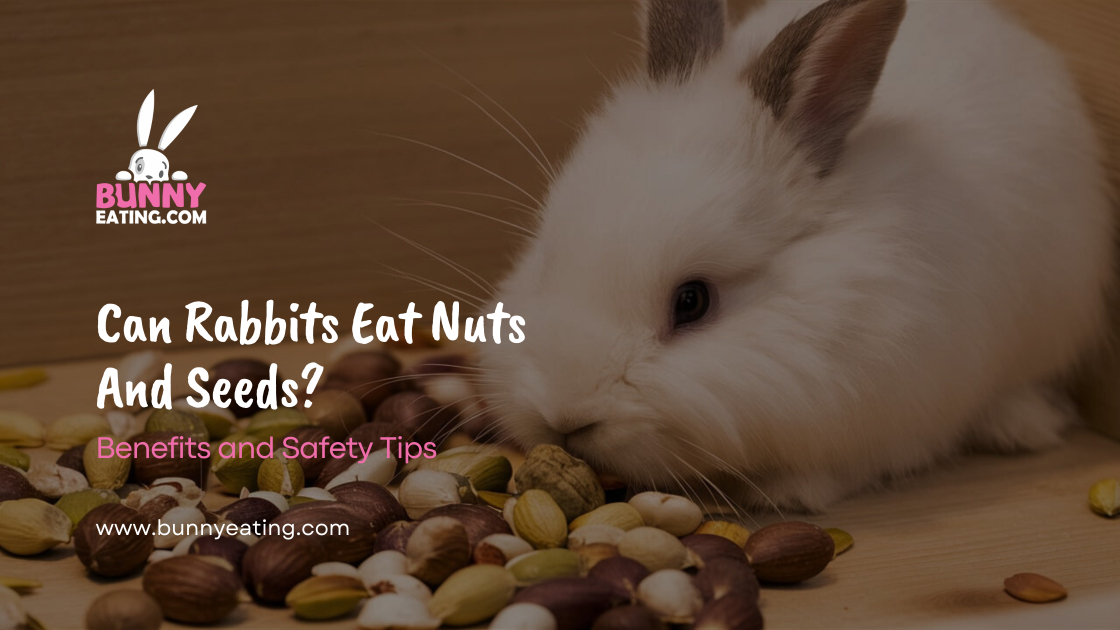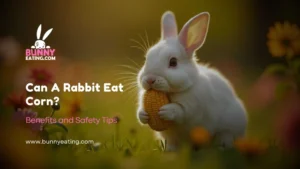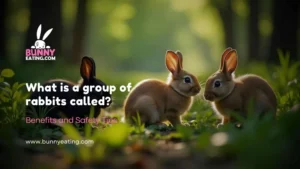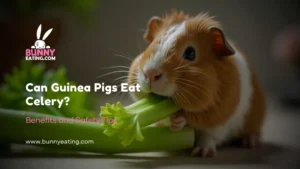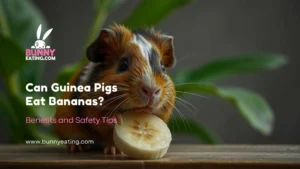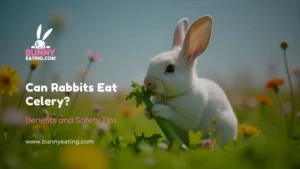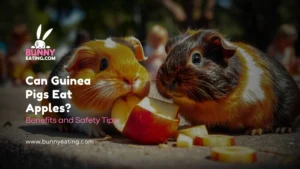Feeding rabbits can be tricky, especially regarding nuts and seeds. While they might seem tasty, they can pose serious health risks for your furry friend. In this article, we’ll explore why nuts and seeds aren’t safe for rabbits, what the potential dangers are, and how to provide a healthier, balanced diet for your pet.
Safe Alternative to Rabbit Eat Nuts and Seeds?
If you are searching for safe alternative foods that you may give to your rabbit, then you should give him free access to fresh hay, leafy greens and good quality rabbit pellets. These options offer the same nutrients as nuts and seeds in serving but with no dangers. You can choose between romaine lettuce, kale, cilantro and any other fresh green vegetable you would like to use in your meals. Fruits should however be offered in small proportions only, perhaps once in a while. It is very important to feed your rabbit on foods that have no traces of pesticides or chemicals to help it maintain a healthy state. Can Rabbits Eat Nuts And Seeds?
Table
ToggleRisks of Feeding Nuts and Seeds to Rabbits?
Feeding nuts and seeds to rabbits can pose several risks. They are high in fat, which can lead to obesity and other health issues in rabbits. Their digestive systems are not designed to process such fatty foods, which can cause gastrointestinal problems. Some seeds and nuts have shells or hard parts that can be choking hazards. Always be cautious and avoid feeding these to your rabbit to maintain their well-being.
Effects of Nuts and Seeds on Rabbits?
Nuts and seeds can negatively impact a rabbit’s health. The high fat content can lead to weight gain and potentially fatty liver disease. Rabbits may also experience digestive issues like stomach upset and blockages. Moreover, the high-calorie content can displace more nutritious foods from their diet, leading to deficiencies. It’s best to stick to foods that are known to be safe and beneficial for rabbits.
Are Nuts and Seeds Good for Rabbits?
No, nuts and seeds are generally not good for rabbits. While they contain some nutrients, the high fat and calorie content make them unsuitable for a rabbit’s diet. Rabbits require a diet high in fibre and low in fat to keep their digestive systems functioning properly. Feeding them nuts and seeds can lead to serious health issues and should be avoided.
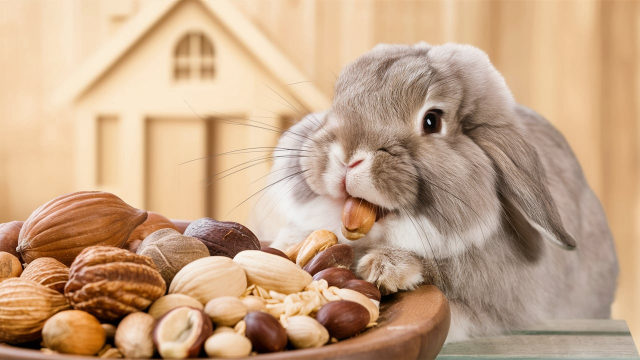
Nutritional Value of Nuts and Seeds for Rabbits?
Nuts and seeds do have nutritional value, but not in a way that’s beneficial for rabbits. They are rich in fats, proteins, and some vitamins and minerals, but these nutrients are not what rabbits need. Rabbits thrive on high-fiber, low-fat diets. The nutritional profile of nuts and seeds does not match the dietary requirements of rabbits and can cause more harm than good.
How are Nuts and Seeds made?
Nuts and seeds come from various plants and trees. Nuts like almonds, walnuts, and peanuts grow on trees, while seeds such as sunflower seeds and pumpkin seeds are harvested from plants. They are often processed by removing shells or husks and sometimes roasted or salted for human consumption. This processing can make them even less suitable for rabbits, who need fresh, natural foods.
What Types of Nuts and Seeds Are Safe for Rabbits?
Generally, no nuts and seeds are recommended for rabbits due to their high-fat content. However, very small amounts of certain seeds, like pumpkin or sunflower seeds, might be less harmful if given as an occasional treat. Still, it’s best to avoid them altogether and stick to rabbit-safe foods like hay, vegetables, and specific fruits to ensure your rabbit remains healthy.
Do Wild Rabbits Eat Nuts and Seeds?
Wild rabbits typically do not eat nuts and seeds. Their natural diet consists mainly of grasses, leaves, and other vegetation. They may occasionally nibble on small seeds or nuts found on the ground, but this is not a significant part of their diet. Wild rabbits rely on high-fibre plants to maintain their digestive health, which is very different from the composition of nuts and seeds.
Why is Eating Nuts and Seeds Harmful to Rabbits?
Eating nuts and seeds is harmful to rabbits because their digestive systems are not equipped to handle high-fat and high-protein foods. The high-calorie content can lead to obesity and other health problems. Additionally, the hard shells and textures of many nuts and seeds can be choking hazards or cause dental issues. It’s important to feed rabbits a diet that aligns with their natural nutritional needs.
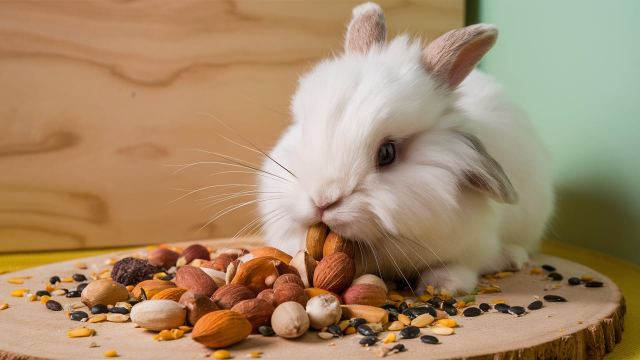
Store-bought Nuts and Seeds and Rabbits
Prepackaged nuts and seeds should not be consumed because they contain some additives such as salt, sugar or flavours that may be dangerous for rabbits. Not to mention that even natural, unprocessed foods like raw nuts and seeds cannot be consumed due to their high-fat content. It gets even worse if the nuts and seeds are processed or have any added flavouring as these may contain things that are poisonous to rabbits. Hazel nuts or sunflower seeds bought from a store should not be used, fresh and rabbit-safe foods should always be chosen.
How Often Can My Rabbit Eat Nuts and Seeds?
Ideally, your rabbit should not eat nuts and seeds at all. If you choose to give them as an occasional treat, it should be very infrequent and in tiny amounts. The risks associated with feeding nuts and seeds to rabbits far outweigh any potential benefits. It’s better to provide healthy, rabbit-safe treats like small pieces of fruit or fresh vegetables.
How Many Nuts and Seeds are there?
There are many types of nuts and seeds, including almonds, walnuts, peanuts, sunflower seeds, and pumpkin seeds. Each type varies in its nutritional content, but generally, they are all high in fats and proteins, making them unsuitable for rabbits. While they are nutritious for humans and some other animals, rabbits require a different dietary composition to stay healthy.
Observing Your Rabbit After Eating Nuts and Seeds?
If your rabbit accidentally eats nuts or seeds, monitor them closely for any signs of distress. Look for changes in their eating habits, lethargy, or signs of digestive discomfort like bloating or changes in their droppings. If you notice any unusual behaviour, contact your veterinarian immediately. Quick intervention can prevent potential health issues from escalating.
What About Nuts and Seeds Seeds and Leaves?
While some seeds and leaves are safe for rabbits, most nuts and seeds, along with their leaves, should be avoided. Some plant leaves can be toxic to rabbits. Always research specific plants and consult with a veterinarian before introducing any new foods into your rabbit’s diet to ensure their safety and health.
Tips for Serving Nuts and Seeds to Bunnies?
It’s best not to serve nuts and seeds to bunnies at all. Instead, focus on providing a balanced diet with plenty of hay, fresh vegetables, and high-quality rabbit pellets. If you want to give your rabbit a treat, opt for small pieces of fruit or special rabbit-safe treats available at pet stores. Always ensure any food you give is free from harmful additives or pesticides.
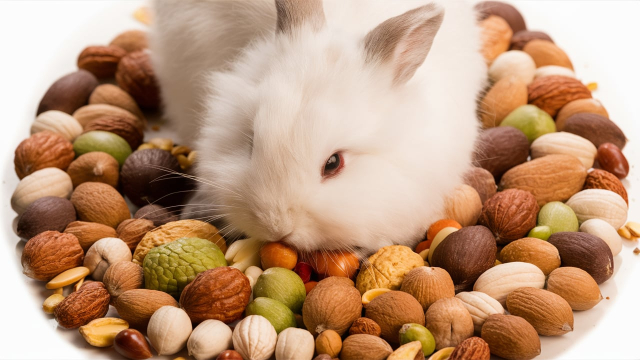
How do Nuts and Seeds Digest in Rabbits?
Rabbits have delicate digestive systems that are not suited for processing high-fat and high-protein foods like nuts and seeds. These foods can cause digestive upset, including bloating, gas, and potentially severe gastrointestinal stasis, a condition where the digestive system slows down or stops. Maintaining a high-fiber, low-fat diet is crucial for proper digestion in rabbits.
What are the nutritional benefits of eating Nuts and Seeds for rabbits?
While nuts and seeds contain beneficial nutrients like vitamins, minerals, and healthy fats, these are not aligned with the nutritional needs of rabbits. The high-fat content can lead to obesity and liver problems, outweighing any potential benefits. Rabbits need a diet rich in fibre and low in fat, which they get from hay, vegetables, and specially formulated rabbit pellets.
Do Rabbits Enjoy Nuts and Seeds Food?
Rabbits might enjoy the taste of nuts and seeds due to their rich flavour, but this does not mean they are healthy for them. Just because a rabbit seems to like a particular food doesn’t mean it should be a regular part of their diet. It’s important to prioritize their health and stick to foods that are known to be safe and beneficial for rabbits.
What parts of Nuts and Seeds can rabbits eat?
Rabbits should generally avoid all parts of nuts and seeds. The kernels are high in fat, and the shells can pose choking hazards or cause digestive blockages. While some seeds like pumpkin or sunflower seeds might be safe in very small amounts, it’s best to avoid them altogether and choose more appropriate treats for your rabbit.
Can Rabbits Eat Nuts and Seeds?
It’s generally not recommended for rabbits to eat any seeds, including those from nuts. While some seeds are less harmful than others, they still pose risks due to their fat content and potential choking hazards. Stick to safer treat options like small pieces of fruit or specially designed rabbit treats that meet their dietary needs.
Can Nuts and Seeds be toxic to rabbits?
Some nuts and seeds can be toxic to rabbits, especially if they are flavoured, salted, or contain any additives. Even plain, raw nuts and seeds can cause serious health issues due to their high-fat content. Always err on the side of caution and avoid feeding nuts and seeds to your rabbit to prevent any potential toxicity.
Can Nuts and Seeds cause digestive problems in rabbits?
Yes, indeed, including nuts, and seeds in the rabbit’s diet can lead to great digestive unrest. They are usually rich in fats which can cause the animals to become obese and develop liver complications, while their hard textures pose the risk of blocking the animal’s digestive system or even choking it. Gastrointestinal issues are a common ailment in rabbits and can even ultimately result in fatal diseases, such as ileus. They should maintain a diet plan that will enhance their bowel movement and keep off their preferred diet plan.
How do you introduce your bunny to Nuts and Seeds?
It’s best not to introduce nuts and seeds to your bunny at all due to the associated risks. If you want to offer new foods, start with small amounts of safe vegetables or fruits. Monitor your rabbit for any adverse reactions and consult with your veterinarian before introducing any new items into their diet to ensure they are safe.
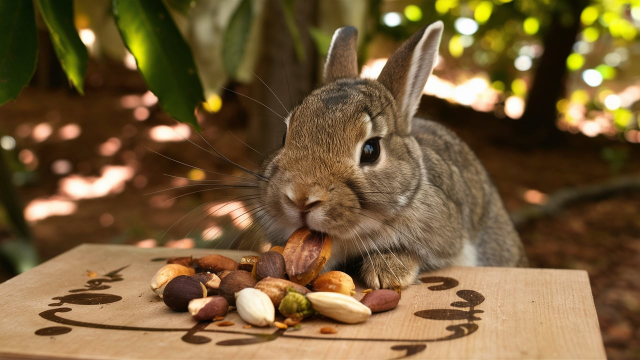
Preparing Nuts and Seeds for Rabbits?
Preparation of nuts and seeds for rabbits is not recommended. Instead, focus on preparing fresh vegetables and other safe foods. Wash all fresh produce thoroughly to remove pesticides and chop it into manageable pieces. Providing a variety of vegetables ensures your rabbit gets a balanced diet while avoiding the risks associated with nuts and seeds.
How do rabbits eat Nuts and Seeds?
Rabbits should not eat nuts and seeds due to the risks involved. If a rabbit does consume them, they might chew on them as they do with other foods, but this can lead to choking or digestive issues. It’s essential to prevent access to nuts and seeds to avoid these dangers and ensure they only eat safe, appropriate foods.
What happens if rabbits eat too much Nuts and Seeds?
If rabbits eat too many nuts and seeds, they can suffer from serious health issues like obesity, digestive blockages, and liver problems. Overconsumption can lead to gastrointestinal stasis, a potentially life-threatening condition where the digestive system stops functioning properly. Immediate veterinary care is necessary if your rabbit has ingested a large amount of nuts and seeds.
What If My Rabbit Eats a Large Amount of Nuts and Seeds?
If your rabbit eats a large amount of nuts and seeds, monitor them closely for signs of distress, including changes in appetite, lethargy, or digestive issues. Contact your veterinarian immediately for advice. They may recommend specific treatments or interventions to prevent serious health complications. Quick action can make a significant difference in your rabbit’s recovery.
How Many Nuts and Seeds Can My Rabbit?
Ideally, your rabbit should not consume any nuts and seeds due to the associated health risks. If you choose to give them, it should be in extremely small quantities and very infrequently. Prioritize their regular diet of hay, vegetables, and pellets, which are specifically designed to meet their nutritional needs and keep them healthy.
When shouldn’t you feed Nuts and Seeds to your Rabbit?
You should never feed nuts and seeds to your rabbit. Their high-fat content and potential for causing digestive issues make them unsuitable for rabbits at any time. Stick to a diet that consists of hay, fresh vegetables, and specially formulated rabbit pellets to ensure your rabbit’s health and well-being.
Can Baby Rabbits Eat Nuts and Seeds?
Yes, nuts and seeds are not suitable for baby rabbits as part of their diet. But their digestive systems are even more delicate than the adult rabbits’ and they need a special diet for their successful growth. Baby rabbits should be fed on their mother’s milk and moistened alfalfa hay; they should later be taken through a process of weaning and fed on hay, vegetables, and rabbit pellets.
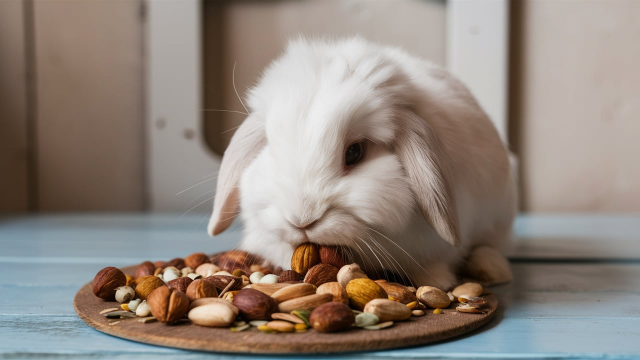
How Frequently Should Adult and Baby Rabbits Be Fed Nuts and Seeds?
Neither adult nor baby rabbits should be fed nuts and seeds. The risks far outweigh any potential benefits. Stick to a consistent diet of hay, vegetables, and pellets for both adult and baby rabbits to ensure they receive the proper nutrition they need without the dangers associated with nuts and seeds.
Potential Dangers in Nuts and Seeds?
Nuts and seeds pose several potential dangers to rabbits. Their high-fat content can lead to obesity and liver problems. The hard shells and textures can cause choking or digestive blockages. Some nuts and seeds may also contain toxins or harmful additives, especially if they are processed or flavoured. It’s best to avoid these risks altogether.
What if my Rabbit accidentally a lot of Nuts and Seeds?
If your rabbit accidentally consumes a large amount of nuts and seeds, observe them closely for any signs of distress or digestive issues. Contact your veterinarian immediately for guidance. They may need medical intervention to prevent serious health complications. Quick action is crucial in such situations to ensure your rabbit’s safety.
Monitoring Your Rabbit’s Health with Nuts and Seeds?
Since nuts and seeds are not recommended for rabbits, there should be no need to monitor their health about these foods. Instead, focus on monitoring their health with a diet rich in hay, vegetables, and pellets. Regular vet check-ups can help ensure they remain healthy and free from any issues related to improper diet.
Incorporating Fresh Greens and Vegetables
Incorporate fresh greens and vegetables into your rabbit’s diet to provide necessary nutrients and variety. Leafy greens like romaine lettuce, kale, and cilantro are great choices. Introduce new vegetables gradually and in small amounts to avoid digestive upset. Always wash produce thoroughly and ensure it is free from pesticides and chemicals.
What actions should I take if my Rabbit consumes Nuts and Seeds?
If your rabbit consumes nuts and seeds, observe them closely for any adverse reactions such as changes in appetite, lethargy, or digestive issues. Contact your veterinarian immediately for advice. They may recommend specific treatments or interventions to prevent serious health complications. Quick action can make a significant difference in your rabbit’s recovery.
Creating a Balanced Diet With Nuts and Seeds
Creating a balanced diet for your rabbit does not include nuts and seeds. Focus on providing a mix of hay, fresh vegetables, and high-quality rabbit pellets. Ensure they have constant access to fresh water. This combination provides the necessary nutrients while avoiding the risks associated with nuts and seeds.
My Rabbit Eat a Whole Nuts and Seeds?
If your rabbit eats a whole nut or seed, monitor them closely for any signs of distress or digestive issues. Contact your veterinarian for guidance. The hard texture can cause choking or blockages, and the high fat content can lead to other health problems. Quick intervention can prevent serious complications.
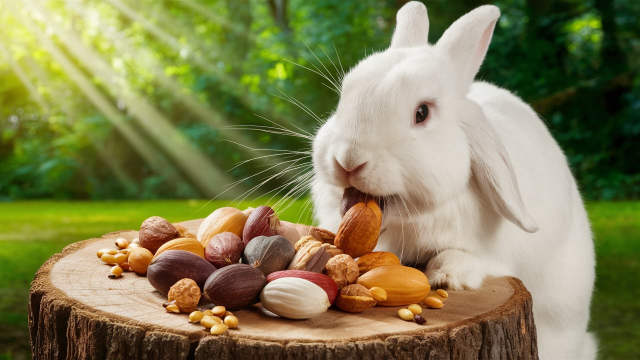
Can Rabbits Eat Wild Nuts and Seeds?
Wild rabbits do not typically eat nuts and seeds as a significant part of their diet. They mainly consume grasses, leaves, and other vegetation. While they might nibble on small seeds found in the wild, this is not common and not necessary for their health. Domestic rabbits should avoid nuts and seeds altogether.
What Else Can I Feed My Rabbit Instead of Nuts and Seeds?
Instead of nuts and seeds, feed your rabbit hay, fresh vegetables, and high-quality rabbit pellets. Fruits can be given as occasional treats. Leafy greens like romaine lettuce, kale, and cilantro are excellent choices. Always ensure any food given is fresh, free from pesticides, and appropriate for a rabbit’s dietary needs.
How to Create a Rabbit-Friendly Garden?
To create a rabbit-friendly garden, plant a variety of safe vegetables and herbs that rabbits can enjoy. Consider planting lettuce, kale, carrots, and parsley. Avoid toxic plants like lilies and rhubarb. Ensure the garden is free from pesticides and chemicals. A rabbit-friendly garden provides a safe space for your pet to explore and enjoy fresh, healthy foods.
Nuts and Seeds Feeding Guidelines and Amounts?
There are no recommended guidelines or amounts for feeding nuts and seeds to rabbits because they are not suitable for their diet. Instead, focus on guidelines for hay, vegetables, and pellets. Ensure your rabbit has unlimited access to hay, a variety of fresh vegetables, and a measured amount of pellets daily.
Rabbit Treats Made at Home With Nuts and Seeds?
Advice to rabbit owners is not to prepare foods with nuts and seeds for pets since they trigger the formation of gas. For instance, instead of using chicken bones, you should prepare rabbit-safe sweets from fresh vegetables and fruits or fresh-cut hay. These ingredients may also be blended and moulded into simple small pocket meals for the preparation of simpler recipes. Any homemade treat must meet rabbit diet requirements and shun products with high fats or protein total, such as nuts or seeds.
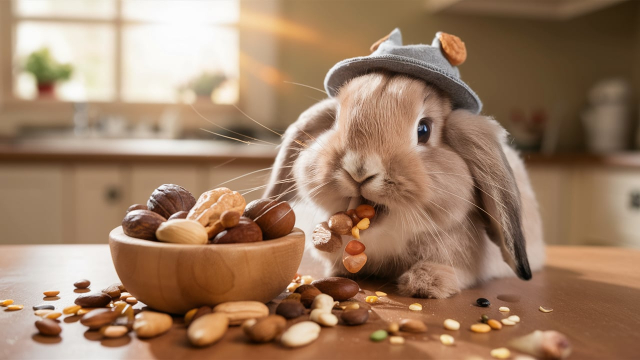
Conclusion
Nuts and seeds may seem tempting, but they’re not suitable for rabbits. Focus on providing a balanced diet of hay, fresh vegetables, and high-quality pellets to keep your rabbit healthy. Avoid the risks associated with nuts and seeds, and choose safer treats instead. Your rabbit’s well-being depends on careful dietary choices.
FAQs
-
Can rabbits eat any nuts or seeds?
No, rabbits should avoid all nuts and seeds due to their high fat content and potential digestive issues.
-
What should I do if my rabbit eats nuts or seeds?
Monitor closely for distress and contact your vet immediately.
-
Are any seeds safe for rabbits?
Very small amounts of pumpkin or sunflower seeds might be less harmful but are generally best avoided.
-
What are safe treats for rabbits?
Opt for fresh vegetables, fruits in moderation, and rabbit-safe treats from pet stores.
-
Why are nuts and seeds bad for rabbits?
They are high in fat and can cause obesity, digestive problems, and choking hazards.

Admin – Pet Expert shares valuable tips on pet care, nutrition, and health, offering practical advice to help your furry friends thrive.
